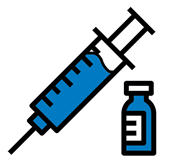Vacci nations protect you, your child and family from many serious diseases. They help protect other people who can’t have vaccinations themselves too. Some people get mild side-effects, but these usually don’t last long.
nations protect you, your child and family from many serious diseases. They help protect other people who can’t have vaccinations themselves too. Some people get mild side-effects, but these usually don’t last long.
Vaccinations are safe and sometimes can get rid of a disease totally.
How Vaccines Work
When your child has a vaccine they develop antibodies to protect against the disease. After this, if your child comes into contact with the disease, their body will recognise it and know how to fight against it with those antibodies.
Top Tips
Do:
Don’t:
Your baby or child may cry for a little while after a vaccination, but they should feel better after a cuddle. Sometimes the area where the needle goes in can be sore and red for 2 to 3 days. This should go away on its own.
Some children may also develop a high temperature but this can usually be managed at home.
Myth Busting
Your baby can still have their vaccinations if:
It's really important that premature babies still have their vaccinations from 8 weeks old. They may be at higher risk of catching infections if you wait.
It may seem very early to give a vaccination to such a tiny baby. But many scientific studies have shown that it's a good time to give them vaccines.
Vaccines do not
Measles and Mumps Increase
Measles and mumps are starting to appear again in England, even though the MMR vaccine is safe and protects against both diseases.
Measles and mumps cases in England have nearly doubled in recent years. The table below shows how many cases of measles and mumps there have been in England in 2016 and 2018.
Year Measles Mumps
2016 541 573
2018 989 1088
Whooping Cough
Whooping Cough, also called pertussis, is a highly contagious bacterial infection of the lungs and airways and can make babies and young children in particular very ill.
Whooping Cough cases are currently rising and protecting your baby/child is very important. Vaccination is the best way to make sure your family are protected and vaccinations are available during pregnancy and when your baby/child is 8, 12 and 16 weeks and 3 years 4 months old.
Pregnant women can help protect their babies by getting vaccinated – ideally from 16 weeks up to 32 weeks pregnant. If for any reason you miss having the vaccine, you can still have it up until you go into labour.
Find more information about Whooping Cough vaccination in pregnancy
If 95% of children receive the MMR vaccine, it's possible to get rid of measles.
However, measles, mumps and rubella can quickly spread again if fewer than 90% of people are vaccinated.
You can contact the Healthy Child Programme by calling Just One Number on 0300 300 0123 or texting Parentline on 07520 631590. Our opening hours are 8am-6pm Monday-Friday (excluding bank holidays) and 9am-1pm on Saturdays.
For questions or queries about school age immunisations you can contact Hertfordshire Community NHS Trust by calling 0300 555 5055 and selecting Option 2 or emailing hct.csaisnorfolk@nhs.net
If you are 11-19 you can text ChatHealth on 07480 635060 for confidential advice from one of our team.
The Lullaby Trust - Baby Check App- This app has simple checks that you can do if your baby is ill and helps you think about whether they need to see a doctor or health professional.
app has simple checks that you can do if your baby is ill and helps you think about whether they need to see a doctor or health professional.
You can speak to other Norfolk parents and carers by clicking our online community forum below.